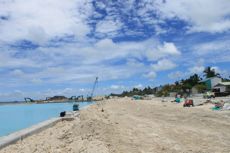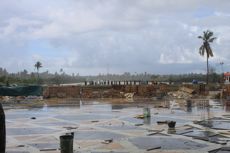“This is the foundation of Addu’s development,” said Addu’s mayor Abdullah Sodiq, referring to the city’s SAARC preparations during a press conference held in Hithadhoo yesterday. He said the projects had been supported by “99 percent” of Addu residents.
Maldivian media was flown to Addu yesterday to observe preparations for the upcoming 17th annual SAARC Summit, scheduled for November 10-12. Festivities will be held in the area starting on the first of the month, in conjunction with the Muslim holiday of Eid.
“We are expecting a lot of traffic through here, and are confident that everything will be ready in time,” Sodiq said. “But this is only the beginning, and we have many more plans for development.”
Addu’s SAARC projects have been underway for six months, officials report. As the deadline approaches, construction teams are working round the clock to finish two harbors, a VVIP lounge, roads and the country’s largest convention center.
Sodiq said the harbors will renovate Addu’s commercial prospects, while the convention center provides new opportunities for locals, officials and foreigners alike.

“The harbor is a central place for Addu, there is demand for it even after SAARC and we have plans to generate more industry and shipping using these new resources,” said Sodiq.
New roads constructed around the convention center have made future road development less expensive for the council’s budget, he added.
Addu’s council also plans to use the Rf115 million convention center, a two-story building of glass, wood and marble with a capacity of 3000, to transform the atoll from a quiet place to a hub of business and tourism.
“We have some representatives talking to businesses in Singapore and Malaysia about hosting events here,” Sodiq told Minivan News. “We will be soliciting bids to find the right event manager to look after the convention center as well. I think there are people interested in what Addu has to offer, and I’m sure we can get a market for it.”
Officials and locals interviewed also hinted at hopes for musical events, theatrical performances, art exhibitions and holiday celebrations.
Ministry of Tourism, Arts and Culture Assistant Director Ahmed Abeer Ismail said the centre’s origins were a sign of Addu’s potential. “That area began as a swamp, now it’s the biggest convention center in the country.” The swamp was heavily landscaped by MNDF and police forces, and now features a few scenic islands.
One of the Maldives’ most strategic atolls, Addu has been largely left to seed since the British withdrew its forces and influence in 1975. City councilor Ahmed Mirzad called SAARC the beginning of a new Addu.
“For 30 years we had Gayoom, and nothing was done in Addu. Then there was a new president, and unlike Gayoom he didn’t just look after Male’, he looked after the entire Maldives. For 30 years we didn’t even have one harbor that was working for Addu, but in the past six months, we have gotten everything,” said Mirzad.
Addu’s councilors were elected for the first time six months ago. Mirzad said the next three years will be a difficult but critical time for the council to prove itself to Addu’s people. Still, the timing is ideal.
“I don’t think, I know that this summit is the right starting point. Now, we will only keep going with our plans to grow,” he said.

One particular operation illustrates the grassroots motives behind the SAARC preparations. Selected from Maldives National University (MNU) Addu first-year students in hospitality, 24 Media Liaison Officers greeted Male’s press pack yesterday.
One young woman said the event was as much for the liaisons as for Male’ press.
“It’ll be challenging to handle foreigners and media personnel,” a group of students concurred. “But we are so happy to have this opportunity.”
“I was shocked to be asked to take part in SAARC, I never thought that I would get to work at something I’d heard so much about,” said another student. “And the certificate of reference that I’ll get afterwards will be really helpful for me when I’m looking for a job after graduation,” she added.
Liaisons have just completed a six-month management course and are attending seminars and briefings for SAARC. They will be divided into 11 teams of two to three officers and assigned to press pooles from different countries.
“The ministry was going to get people from Male’, but I suggested we use the local energy. They are good, they can do the job, and this is a key event, so why shouldn’t these students take part?” said Abeer.
Addu’s development isn’t only tailored to foreigners; Sodiq said part of the development plan is to bring Addu residents home.
“Unlike other islands, we have historical places to visit and our islands are connected, so tourists can actually see more than the sun, sand and sea. We will be constructing more lodgings as well, and our hospital and airport are going to be expanded. More business means more jobs, and part of the purpose of all this is to bring Addu citizens back after their migrations to Male’,” he said.
In Addu, infrastructure is a priority for community growth. Noting that education was key to development, Sodiq said that a Kangaroo school is scheduled to open next year, and a Billabong school is being considered.
For the moment, however, Addu’s mind is on SAARC.
With teams working around the clock to complete harbors in Gan and Feydhoo, and MNDF motorcades practicing their moves late into the night, Addu is a bustle of construction and security.
Both harbors were originally due for completion on October 25, yet concrete foundations have not yet been laid. However officials assure that they are 90 percent complete. When asked about setbacks, National Security Advisor Ameen Faisal said, “The weather. Due to heavy rains, many projects were delayed. It was unexpected and beyond our control, but we managed and we are on target.”
Inquiries of Addu’s appearance for SAARC yielded few details. “It’s a secret, we want it to be a surprise,” Faisal and Sodiq concurred.
Security, however, is highly detailed.
MNDF has delegated security teams to specific event components including media, medical, resort transport, and the airport. “Right now we are very confident in our security personnel and do not anticipate any problems during the SAARC summit,” said International Media Coordinator Ahmed Ibrahim.
Ibrahim added that “it will be helpful to have the extra security forces that other countries are providing because Addu is very big.” In addition to ground security, MNDF will be supported by the coast guard, which will establish multiple security layers around Addu’s marine perimeter, special task forces from Sri Lanka, and surveillance equipment from China, among others.
Summit guests include three of the world’s most controversial heads of state from India, Pakistan and Afghanistan. Their reputations do not appear to cause anxiety to SAARC officials.
“They will not receive any special treatment, unless requested of course,” said MNDF Commander of SAARC Airport Security, Ahmed Shafeeq.
“There is no risk at all,” said Faisal. “We aren’t even bothered about it.”


